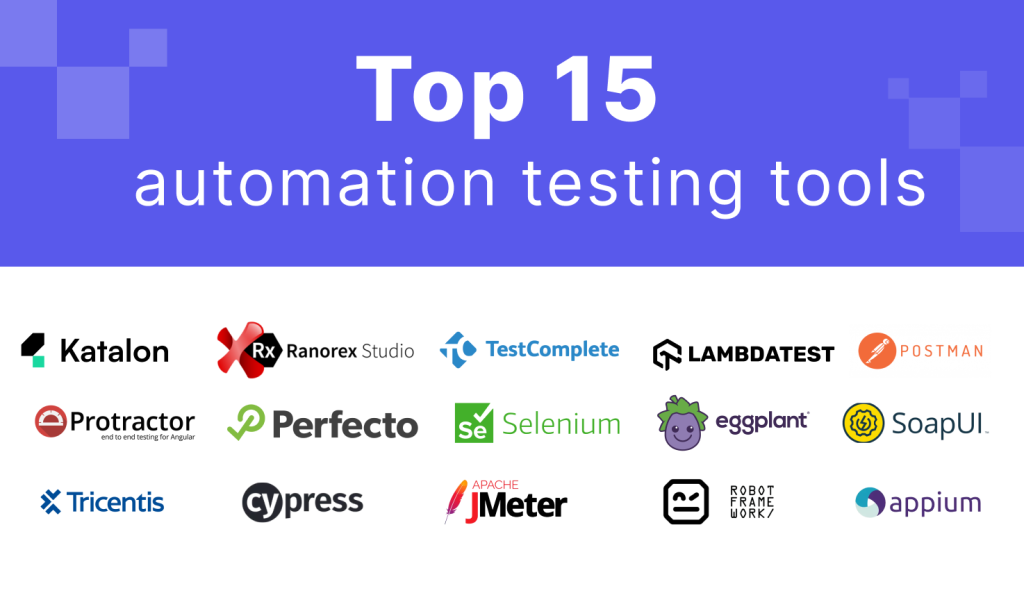Revolutionary Software Testing Tools 2023: Unleashing The Power Of Next-Gen Testing Solutions!
Software Testing Tools 2023
Introduction
Dear Readers,
1 Picture Gallery: Revolutionary Software Testing Tools 2023: Unleashing The Power Of Next-Gen Testing Solutions!

Welcome to an informative article on software testing tools for the year 2023. In the rapidly evolving world of technology, the demand for efficient and reliable software testing tools is increasing. As businesses strive to deliver high-quality software products to their customers, it is crucial to stay updated with the latest tools and techniques in the industry. In this article, we will discuss the top software testing tools that are expected to dominate the market in 2023 and their impact on the testing process.
Table of Contents
Section
Page

Image Source: katalon.com
1. Introduction
1
2. What are software testing tools?
2
3. Who uses software testing tools?
4
4. When to use software testing tools?
6
5. Where to find software testing tools?
8
6. Why are software testing tools important?
10
7. How to choose the right software testing tools?
12
8. Advantages and disadvantages of software testing tools
14
9. FAQ
16
10. Conclusion
18
11. Final Remarks
20
2. What are software testing tools?
Software testing tools are applications or platforms that assist testers in automating, managing, and executing software testing processes. These tools are designed to enhance efficiency, accuracy, and effectiveness in testing software applications. They provide a wide range of functionalities, such as test case management, test script creation, bug tracking, and performance monitoring.
2.1 Test Case Management
Test case management tools help testers organize and manage test cases, test data, and test execution results. They provide a centralized repository for storing test artifacts and facilitate collaboration among team members. These tools enable testers to create, execute, and track test cases efficiently.
2.2 Test Script Creation
Test script creation tools enable testers to automate test cases by writing scripts or using record and playback functionalities. These tools support various programming languages and frameworks, allowing testers to create robust and reliable test scripts. They help save time and effort in executing repetitive test cases.
2.3 Bug Tracking
Bug tracking tools are essential for identifying, documenting, and tracking software defects or issues. These tools provide a systematic approach to report and manage bugs throughout the testing cycle. They ensure effective communication between testers, developers, and other stakeholders, leading to faster bug resolution.
2.4 Performance Monitoring
Performance monitoring tools help assess the performance and scalability of software applications under different load conditions. These tools measure response times, resource utilization, and system behavior to identify performance bottlenecks. They assist in identifying and resolving performance issues before the software is deployed.
4. When to use software testing tools?
Software testing tools should be utilized throughout the software development lifecycle to ensure the quality, reliability, and functionality of the software. The following are the key stages where software testing tools play a crucial role:
4.1 Requirements Analysis
During requirements analysis, software testing tools can be used to validate and verify the requirements, ensuring that they are complete, consistent, and testable. These tools help identify any ambiguities or contradictions in the requirements, minimizing potential risks later in the development cycle.
4.2 Test Planning
In the test planning phase, software testing tools assist in creating test strategies, test plans, and test schedules. Test management tools help allocate resources, define test objectives, and estimate effort and cost. These tools ensure efficient test planning and enable effective test coverage.
4.3 Test Execution
During the test execution phase, software testing tools automate the execution of test cases and generate test reports. Test execution tools provide detailed logs, screenshots, and videos to aid in defect reproduction and resolution. Testers can track the progress of testing activities and identify any deviations from the expected results.
4.4 Defect Management
Software testing tools streamline defect management by providing a centralized platform for bug reporting, tracking, and resolution. These tools enable testers to prioritize, assign, and monitor the status of defects. They facilitate effective collaboration between testers, developers, and other stakeholders in resolving issues.
4.5 Performance Testing
Performance testing tools are specifically designed to evaluate the performance, scalability, and stability of software applications. These tools simulate real-life user scenarios and measure the system’s response under different load conditions. Performance testing tools help identify performance bottlenecks and optimize system performance.
4.6 Regression Testing
Regression testing tools automate the execution of test cases to ensure that existing functionalities are not affected by new changes or updates. These tools help detect any unintended side effects or regressions in the software. Regression testing tools play a critical role in maintaining the integrity and stability of the software.
4.7 Continuous Integration/Continuous Delivery (CI/CD)
Software testing tools integrate seamlessly with CI/CD pipelines to enable continuous testing and delivery of software. These tools automate the testing process, ensuring that every code change is thoroughly tested before deployment. They help achieve faster and more frequent releases, reducing time-to-market.
8. Advantages and Disadvantages of Software Testing Tools
Like any other technology, software testing tools come with their own set of advantages and disadvantages. Let’s explore both aspects:
8.1 Advantages of Software Testing Tools
1. Increased Efficiency: Software testing tools automate repetitive and time-consuming tasks, saving valuable time and effort for testers.
2. Improved Accuracy: Automation reduces the risk of human errors, ensuring accurate and consistent test results.
3. Enhanced Test Coverage: Testing tools enable testers to execute a large number of test cases, covering various scenarios and edge cases.
4. Faster Time-to-Market: Automation speeds up the testing process, allowing faster releases and quicker time-to-market.
5. Comprehensive Reporting: Testing tools generate detailed reports, providing insights into test coverage, defect analysis, and overall quality.
8.2 Disadvantages of Software Testing Tools
1. Initial Investment: Acquiring and implementing testing tools can require significant upfront costs, including licensing fees and training expenses.
2. Learning Curve: Testers need to familiarize themselves with the tools, which may have a learning curve depending on their complexity.
3. Maintenance Effort: Testing tools require regular updates, patches, and maintenance to ensure optimal performance and compatibility with the latest technologies.
4. Limited Test Scope: Automation may not be suitable for all types of testing, such as usability testing or exploratory testing, which require human judgment and creativity.
5. False Positives/Negatives: Test automation can produce false positive or false negative results, requiring manual intervention for verification.
9. FAQ
9.1 Can software testing tools replace manual testing entirely?
No, software testing tools cannot replace manual testing entirely. While automation can accelerate the testing process and improve efficiency, manual testing is still necessary for certain types of testing, such as usability testing and exploratory testing that require human judgment and creativity.
9.2 How to choose the right software testing tool for my project?
Choosing the right software testing tool depends on various factors such as project requirements, budget, team skills, and the type of testing needed. Consider factors like tool features, scalability, ease of use, support, and compatibility with other tools in your development ecosystem before making a decision.
9.3 Are software testing tools suitable for small businesses?
Yes, software testing tools are suitable for small businesses as they can significantly enhance the efficiency and effectiveness of the testing process. However, it is essential to consider the specific needs and budget constraints of the business before investing in testing tools.
9.4 Are open-source testing tools as effective as commercial ones?
Open-source testing tools can be as effective as commercial ones, depending on the project requirements and the skills of the testing team. Open-source tools offer advantages like cost-effectiveness, flexibility, and community support, but commercial tools may provide additional features, support, and enterprise-level capabilities.
9.5 What are the key factors to consider while implementing software testing tools?
Key factors to consider while implementing software testing tools include training and skill development, stakeholder buy-in, tool integration with existing processes and systems, scalability, maintenance efforts, and return on investment. Proper planning and execution are crucial for successful implementation.
10. Conclusion
In conclusion, software testing tools have become indispensable in the software development lifecycle. As we approach the year 2023, it is essential for businesses to stay updated with the latest tools and technologies to ensure high-quality software products. By leveraging the right software testing tools, organizations can streamline their testing processes, improve efficiency, and deliver reliable software to their customers. Remember to carefully evaluate the advantages and disadvantages of each tool and select the ones that best fit your project requirements and testing goals.
11. Final Remarks
Friends, the world of software testing is evolving rapidly, and it is crucial for testers and businesses to adapt to these changes. While software testing tools can greatly enhance the testing process, it is important to emphasize the importance of human expertise and judgment in achieving optimal results. The selection and implementation of the right software testing tools should be a strategic decision based on thorough evaluation and consideration of various factors. Always stay updated with the latest trends and advancements in the industry to ensure the success of your testing efforts. Best of luck!
This post topic: Software Tutorials

